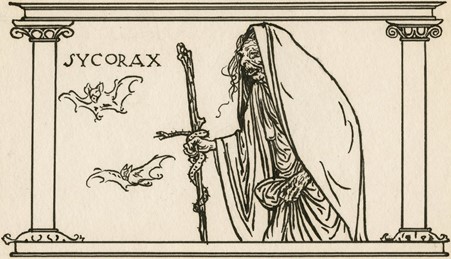WHAT IS YOUR NAME? NOMENCLATURE IN THE TEMPEST PART III
Part III: Trinculo, Stephano and Caliban
Richard Martin’s third instalment of lectures on names in The Tempest, see the first and second instalments, as he explores the nomenclature of Trinculo, Stephano and Caliban as a supplement to his A-Level English Literature teaching.
Trinculo
Trinculo derives from the Italian verb ‘to drink deeply’ and he appears to be living up to his name when, having sampled the ‘sack’ (or fortified wine that comprised the contents of the barrel upon which his friend, Stephano floated ashore) he asks, ‘hast thou any more of this?’
In fact, Trinculo’s name imposes a limit on his character that the play itself allows him to transcend. He is in truth more aware of the dangers of excessive drinking than Stephano who proposes that no water will be drunk until their supply of alcohol has been exhausted:
Tell not me; when the butt is out, we will drink water; not a drop before: therefore bear up, and board ’em. Servant-monster, drink to me.
These are the lines that begin the second scene in which Stephano and Trinculo appear and the effect of in media res opening is to enable an audience to reconstruct what Trinculo must have said to Stephano to generate such a response. Trinculo must have been advising caution and moderation where their drinking is concerned. The 2016 RSC production acknowledges this by having Trinculo refuse the proffered bottle by signalling that he is about to retch from that already drunk. Alternating water with alcohol is always a sensible suggestion and Stephano’s rejection of it identifies him as the real fool of the play. For all the implications of Trinculo’s name he more obviously knows his limits than Stephano. The latter’s words lead Trinculo, the professional fool of the play into a wise meditation on the ways excessive alcohol militates against good government:
‘…the folly of this island! They say there’s but five upon this isle: we are three of them; if th’ other two be brained like us, the state totters.’
Intermittently in this play Shakespeare exploits a paradox more prevalent in his previous plays in which fools are continually wise. It is, I think, notable that this paradox is only available to us sporadically in The Tempest, for not everything this jester says is remarkable but, on the other hand, he impresses an audience far more than does Stephano who has ambitions to become king of the island. The sporadic wisdom of Trinculo yields in the play, for example, a Montaigne-like meditation on the oddity of his own society when he is stuck by the fact that in Europe:
‘When they will not give a doit to relieve a lame beggar, they will lazy out ten to see a dead Indian.’
Gonzalo speaks of instituting a set of policies in his utopic commonwealth which would be ‘contrary’ to those of his own society and Trinculo approximates the former’s subversive imagination by identifying a topsy-turvy quality to European values, requiring radical adjustment. Implicitly, Trinculo recognises that charity for one’s countrymen is preferable to selfishly motivated morbid curiosity in respect of natives – who often died in transit to Europe, due to having immune systems unable to deal with Western diseases. In the same speech, he reaches a conclusion concerning the humanity of Caliban, and if the conclusion appears hard-won and expressed in terms of a bodily function rather than an intellectual process (‘I do now let loose my opinion, hold it no longer’), it is in advance of Prospero who for 12 years has not ‘honoured (Caliban) with a human shape’. Interestingly it is only when Trinculo has become inebriated that he reverts to a way of looking at Caliban that is in line with Prospero’s throughout the play:
‘Thou liest, most ignorant monster: I am in case to justle a constable. Why, thou deboshed fish thou, was there ever man a coward that hath drunk so much sack as I to-day? Wilt thou tell a monstrous lie, being but half a fish and half a monster?’
 Trinculo exhibits here a tendency in the inebriated to become bellicose. It is thus to his credit later in the scene that he is self-reflexive enough to recognise this phenomenon in his acknowledgement that Stephano’s fraying temper and the spirit of discord that now reigns are precisely the consequence of the alcohol:
Trinculo exhibits here a tendency in the inebriated to become bellicose. It is thus to his credit later in the scene that he is self-reflexive enough to recognise this phenomenon in his acknowledgement that Stephano’s fraying temper and the spirit of discord that now reigns are precisely the consequence of the alcohol:
‘I did not give the lie. Out o’ your wits and bearing too? A pox o’ your bottle! this can sack and drinking do.’
Though drunk enough to engage in redundancy (sack and drinking amount to the same thing given that the former is what they are drinking), he is also perceptive enough to recognise the detrimental effects of excessive wine bibbing. Trinculo’s name is thus not absolutely defining.
Stephano

His boon companion, Stephano is a more limited figure than Trinculo but he has a richer name, reflecting his real nature, but also risible aspirations. Stephano is both Neapolitan slang for ‘belly’ but also Greek for ‘wreath’ or ‘crown’. His name encapsulates both his appetite for alcohol and for social ascendency. The latter is first evident to us in the juxtaposition between Trinculo’s more modest ambitions with regard to Caliban –
‘Were I in England now, as once I was, and had but this fish painted, not a holiday fool there but would give a piece of silver: there would this monster make a man; any strange beast there makes a man’
and Stephano’s more over-reaching variant:
‘if I can recover him and keep him tame and get to Naples with him, he’s a present for any emperor that ever trod on neat’s leather.’
 Trinculo’s fantasy extends only so far as earning enough money to buy himself a coat of arms, whereas Stephano imagines rubbing shoulders with an emperor – potentially Philip II of Spain (1527-98). This ambition escalates at the end of the scene into the following proposition:
Trinculo’s fantasy extends only so far as earning enough money to buy himself a coat of arms, whereas Stephano imagines rubbing shoulders with an emperor – potentially Philip II of Spain (1527-98). This ambition escalates at the end of the scene into the following proposition:
‘Trinculo, the king and all our company else being drowned, we will inherit here: here; bear my bottle.’
It escalates still further in the next scene to feature these fabliaux-like figures:
‘Monster, I will kill this man: his daughter and I will be king and queen–save our graces!–and Trinculo and thyself shall be viceroys. Dost thou like the plot, Trinculo?’
In the 2016 RSC production of The Tempest Trinculo delivers his response (‘Excellent’) with venomous sarcasm, reflecting his greater intelligence and recognition of the increasingly unhinged nature and inebriated state of his friend.
Caliban
Given that Montaigne’s essay ‘Of Cannibals’ is important enough in the play to have a section from it quoted verbatim by Gonzalo, the most obvious meaning of Caliban’s name derives from its status as a near anagram of the word ‘cannibal’. The word meant in its first Western usage ‘native’: Othello notably refers to ‘cannibals’ and ‘anthropophagy’ indicating not a redundancy in his language but a distinction regrettably later lost. Its later received meaning underlines the political nature of language since the word in blurring the distinction between the victims of colonisation and human flesh eaters legitimises imperialism by under-scoring the moral inferiority of those whose lands were seized.
But this simple meaning of Caliban’s name is actually complex in its effect since it drives a wedge between the ways he is described as ‘fish’ or ‘mooncalf’ or ‘monster…got by the devil himself’ and the simple fact of his humanity. As noted above this is something Trinculo acknowledges within a very short duration of time. Prospero, of course, has a vested interest in denying for 12 years what Trinculo identifies within five minutes.
Here is a very striking section (Where Does Caliban’s Name Come From?) from the Humanities Core Research Blog which identifies the precise date when the word ‘cannibal’ entered Western discourse. The article’s thesis on the original meaning of the word gives Caliban back the humanity Prospero denies him and recalibrates the word ‘cannibal’ to mean no more nor less than ‘human being’:
‘We can date with precision the day that this word first came into contact with European languages, since it is a loan word from the Caribbean and is first recorded in Christopher Columbus’s journal of his first voyage to the New World. On Friday, November 23, 1492, a little more than a month after first landing in the Bahamas, Columbus was off the coast of Haiti. Some natives of the Greater Antilles who were on board warned him about the men who lived there:
The wind was East-Northeast, and they could shape a southerly course, but there was little of it. Beyond this cape there stretched out another land or cape, also trending east, which the Indians on board called Bohio [Haiti]. They said that it was very large, and that there were people in it who had one eye in their foreheads, and others whom they called canibales, of whom they were much afraid. (English translation by Clements R. Markham, slightly revised)…
It is difficult to say much with certainty about the languages of the native inhabitants of the Caribbean in 1492. But using historical linguistics we can make educated guesses about the word Columbus may have heard and why he wrote it down the way he did. In the Kari`nja [or Kali`nja] language spoken by the Kalinago today, the word kari`na means “human being,” and Karinago means “the people.” However, the /r/ used to spell this language does not correspond to the same [r] sound we have. Instead, it refers to [ɽ] a sound made by flicking the tongue very quickly against the alveolar ridge behind your teeth. To someone who doesn’t speak Kari`nja [kaɽiɁnʲa], this might sound like an [r] or an [l], which is why their name is variously transcribed as ‘Carib,’ ‘Kali`na,’ ‘Kari`nja,’ ‘Kalinya,’ ‘Cariña,’ ‘Carib,’ or even ‘Galibi.’
My reading of The Tempest is – and was long before I discovered this extraordinary etymological analysis – attuned to the idea that Caliban is a human being. It is gratifying to discover that the word ‘cannibal’ might originally have this very simple and absolutely non-exotic meaning. But it is also unfortunate that even a modern prestigious production of the play as mounted by the RSC as recently as 2016 could present him otherwise. Caliban’s anxiety, shared with Stephano and Trinculo, that Prospero will turn them in ‘to apes
with foreheads villainous low’ is never noted for providing the audience with still further evidence of Caliban’s human status. A monster might regard such a make-over as a distinct improvement but not a human being.
 Another theory of the name’s etymology identifies it as the Rumanian for ‘black’. This is a feasible interpretation given that Caliban’s mother was born in Algiers though the play is noticeable for its omission of whether she is Algerian. I’m rather fond of Leah Marcus’ revisionist claim that Sycorax’s ethnicity is cast into doubt by the description of her as a ‘blue-eyed hag’, though the conventional view that this refers to iron deficiency giving a blue-tinge to a pregnant women’s eye-lids seems relatively compelling. Marcus does not note that the Berber tribe have blue eyes so that which seems to grant her ethnic ambiguity might in fact provide her character with an ethnic specificity – albeit one that is delightfully disruptive of the kind of stereotypes Prospero produces. I’d argue that neither Sycorax’s skin pigmentation nor her magic equate to Prospero’s conception of her as black but then I’ve never seen Prospero’s magic as white! The two meanings of Caliban’s name coalesce in the implication that he is a black human being. All productions of the play should take note of this.
Another theory of the name’s etymology identifies it as the Rumanian for ‘black’. This is a feasible interpretation given that Caliban’s mother was born in Algiers though the play is noticeable for its omission of whether she is Algerian. I’m rather fond of Leah Marcus’ revisionist claim that Sycorax’s ethnicity is cast into doubt by the description of her as a ‘blue-eyed hag’, though the conventional view that this refers to iron deficiency giving a blue-tinge to a pregnant women’s eye-lids seems relatively compelling. Marcus does not note that the Berber tribe have blue eyes so that which seems to grant her ethnic ambiguity might in fact provide her character with an ethnic specificity – albeit one that is delightfully disruptive of the kind of stereotypes Prospero produces. I’d argue that neither Sycorax’s skin pigmentation nor her magic equate to Prospero’s conception of her as black but then I’ve never seen Prospero’s magic as white! The two meanings of Caliban’s name coalesce in the implication that he is a black human being. All productions of the play should take note of this.

An illustration of Sycorax by Robert Anning Bell (1862-1933) but is this how we really see the woman who arrived on the island pregnant with Caliban a matter of years before Prospero and died before he arrived? ’Age and envy’ might seem more obviously attributes of Prospero in Shakespeare’s play.
The above image of Sycorax takes us full circle, given my remarks about this unseen character in the first lecture of the series. Of the main characters, only Ferdinand has so far been omitted from discussion. His name has the positive connotations we might have expected and derives from Germanic roots where it means ‘brave’ and ‘travel’ – both relevant ideas in relation to this character for he challenges Prospero and functions as an ‘Aeneas’ figure who can take his ‘Dido’ back with him to the Italian mainland. Interestingly, the use of the name indicates Shakespeare’s very different attitudes relative to his fellow playwright, John Webster. Two years later Webster would change the historical name of the Duchess of Malfi’s brother from Carlo to the even more emphatically Iberian ‘Ferdinand’ in order to intensify audience hatred by mobilising its Hispanophobia. Considerations of this kind do not seem to have occurred to Shakespeare and it is worth asking why.

